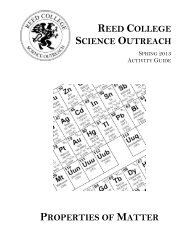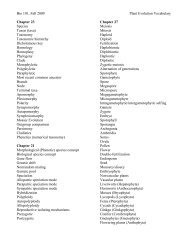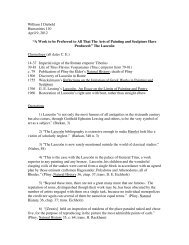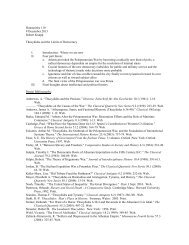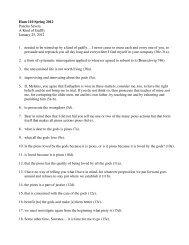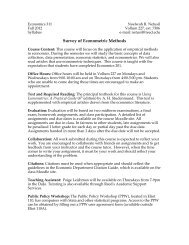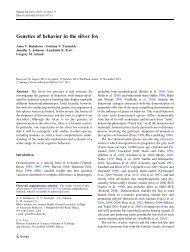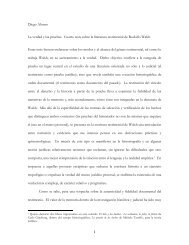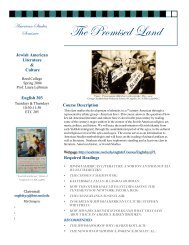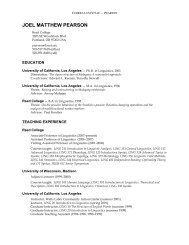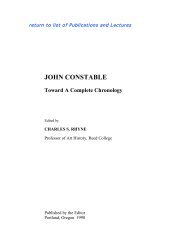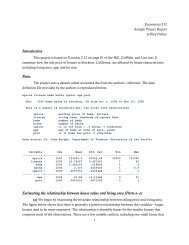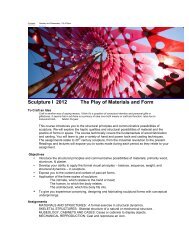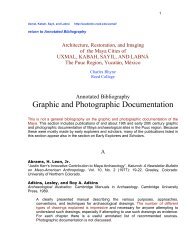The Solitary Reaper - Reed College
The Solitary Reaper - Reed College
The Solitary Reaper - Reed College
You also want an ePaper? Increase the reach of your titles
YUMPU automatically turns print PDFs into web optimized ePapers that Google loves.
First publication date: 1807 / RPO poem editor: Ian Lancashire, J. R. MacGillivray / RP edition: 3RP 2.386.<br />
Recent editing: 2:2002/3/20*1:2002/9/9*1:2002/11/7*1:2006/3/3 Composition date: 5 November 1805<br />
Rhyme: ababccdd or abcbddee<br />
Commentary by Ian Lancashire (2002/9/9)<br />
Wordsworth's preface to the 1800 Lyrical Ballads argues that poetry "contains a natural delineation of human passions,<br />
human characters, and human incidents." It ought not be judged by the presence of artificial, poetic diction. Rather, "the<br />
language of conversation in the middle and lower classes of society" can be its medium. "<strong>The</strong> <strong>Solitary</strong> <strong>Reaper</strong>" exemplifies<br />
these beliefs.<br />
Written seven years after Lyrical Ballads, it describes a nameless listener's delight in a young woman's melancholy song<br />
in an unknown language as, working by herself in a Scottish valley, she swings a sickle, reaping grain. Four eight-line<br />
stanzas, each closing with two couplets and all written in octosyllabic lines, have a musical lilt. Short lines deliver the rhymes<br />
at a quick pace. Sentences normally need two or more such short lines to complete, so that few lines are strongly endstopped;<br />
most freely enjamb. Diction is conversational. Often lines consist mainly of monosyllabic words (4-5, 13, 17, 21,<br />
24, 27, 30-32). Wordsworth prefers common verbs, "behold," "reap," "sing," "stop," "pass," "cut," "bind," "chant," "hear,"<br />
and "break." Words imported into English from Latin or Greek, like "solitary" and "melancholy" or forms with "-ive" and "ion"<br />
endings (e.g., "plaintive" and "motionless"), are infrequent.<br />
Wordsworth writes plain, almost undemanding verse. For example, he repeats the simplest idea in varying words. <strong>The</strong><br />
girl is "single," "solitary," and "by herself" (1-3). She is "reaping" (3), that is, "cuts and binds the grain" (5), "o'er the sickle<br />
bending" (28). <strong>The</strong> onlooker is both "motionless and still" (29). <strong>The</strong> lass "sings" (3, 17, 25, 27) or does "chant" (9) a "strain"<br />
(6), a "lay" (21), or "a song" (26). <strong>The</strong> speaker relies on everyday idioms, worn to vagueness by overuse in ordinary talk. Her<br />
"theme" (25) is of "things" (19) or "matter" (22) "That has been, and may be again" (24). This excludes only what never<br />
existed at all. Whenever the speaker might become elevated in speech, his language seems prosaic, even chatty: "Will no one<br />
tell me ..." (17), "Whate're the theme" (25), and "Long after it was heard no more" (32). Wordsworth notes, pointedly, that<br />
this last line comes verbatim from a prose travel book.<br />
"<strong>The</strong> <strong>Solitary</strong> <strong>Reaper</strong>" does not implement, programmatically, his dogma of plain diction. For example, "Vale profound"<br />
(7), "plaintive numbers" (18), and "humble lay" (21) are semi-formulaic catch phrases in the very eighteenth-century verse<br />
whose artificiality he rejects. <strong>The</strong>se exceptions may be deliberate, characterizing the speaker (not Wordsworth) as someone<br />
for whom poetry means much. He resorts to formulas as if to hint that the girl's song is out-of-place in the valley, however<br />
separated from the traditions of fine verse by her class, occupation, and location. Wordsworth may deliberately impoverish<br />
his speaker's language so as to contrast it with the reaper's song.<br />
Unlike other poets, this lass sings alone, isolated from both her predecessors (her "poetic tradition") and any audience.<br />
Dryden, Pope, Gray, and so many others defined themselves by quoting from classical literature and each other.<br />
Wordsworth's "<strong>The</strong> <strong>Solitary</strong> <strong>Reaper</strong>" shatters this continuity. Her song, like a found poem, springs directly from nature,<br />
without literary context. Her "music" runs like water ("overflowing" the valley) and surpasses the beauty of two celebrated<br />
English song-birds, the nightingale and the cuckoo. Here again the speaker raids conventional poetic language, as if incapable<br />
of finding truly suitable language. Ironically, both his analogies break down. Reaping takes place at harvest time, in the<br />
autumn, not in the spring or summer, seasons traditionally associated with the cuckoo and the nightingale. <strong>The</strong> reaper, a<br />
single "Maiden" (25), hardly fits the myth of married Philomela, rape victim and tragic revenger, even though the reaper<br />
sings in a melancholic, plaintive way about "Some natural sorrow" (23). <strong>The</strong> strange language in which the lass chants also<br />
removes her from any poetic tradition known to the speaker. He comprehends only her "sound," "voice," and "music," though<br />
it rings in his heart -- his memory -- "long after it was heard no more" (32).<br />
This simple confession redeems the speaker from his own impoverished language. He bears witness to something that<br />
eighteenth-century poetry seemed at times embarrassed of. What transfixes him in song is not its content, but its emotionally<br />
expressive music. <strong>The</strong> listener does not understand why she sings in melancholy, only what the emotion itself is. This feeling<br />
"could have no ending" (26), as if she, like Keats' Ruth amid the alien corn, communicates wordlessly something universal<br />
about the human condition. Despite its sadness, the song helps the speaker to mount up the hill (30). In current psychology,<br />
the capacity to feel emotion and link it to goals makes life, indeed survival itself, possible. <strong>The</strong> speaker's "heart" (31), by<br />
bearing her music, can go on. For that reason, "<strong>The</strong> <strong>Solitary</strong> <strong>Reaper</strong>" relates an ecstatic moment in which a passer-by<br />
transcends the limitations of mortality. Both the song and he go on together.<br />
Bibliography<br />
Finch, Geoffrey J. "Wordsworth's <strong>Solitary</strong> Song: <strong>The</strong> Substance of 'true art' in '<strong>The</strong> <strong>Solitary</strong> <strong>Reaper</strong>'." Ariel 6.3 (1975): 91-100. PR/1/A75<br />
Howard, William. "'Obstinate questionings': <strong>The</strong> Reciprocity of Speaker and Auditor in Wordsworth's Poetry." Philological Quarterly 67.2<br />
(Spring 1988): 219-39.<br />
James, G. Ingli, and Pittock, Malcolm. "Wordsworth's '<strong>The</strong> <strong>Solitary</strong> <strong>Reaper</strong>'." Essays in Criticism 15 (1965: 65-76. PN/2/E77<br />
Jones, Nancy A. "<strong>The</strong> Rape of the Rural Muse: Wordsworth's '<strong>The</strong> <strong>Solitary</strong> <strong>Reaper</strong>' as a Version of Pastourelle." In Higgins, Lynn A., and<br />
Silver, Brenda R., eds. Rape and Representation (New York: Columbia University Press, 1991): 263-77. PN 56 .R24R37 1991<br />
McSweeney, Kerry. "Performing '<strong>The</strong> <strong>Solitary</strong> <strong>Reaper</strong>' and 'Tears, Idle Tears.'" Criticism: A Quarterly for Literature and the Arts 38:2<br />
(Spring 1996): 281-302.<br />
Preston, John. "'<strong>The</strong> Moral Properties and Scope of Things': <strong>The</strong> Structure of <strong>The</strong> <strong>Solitary</strong> <strong>Reaper</strong>." Essays in Criticism 19 (1969): 60-66.



